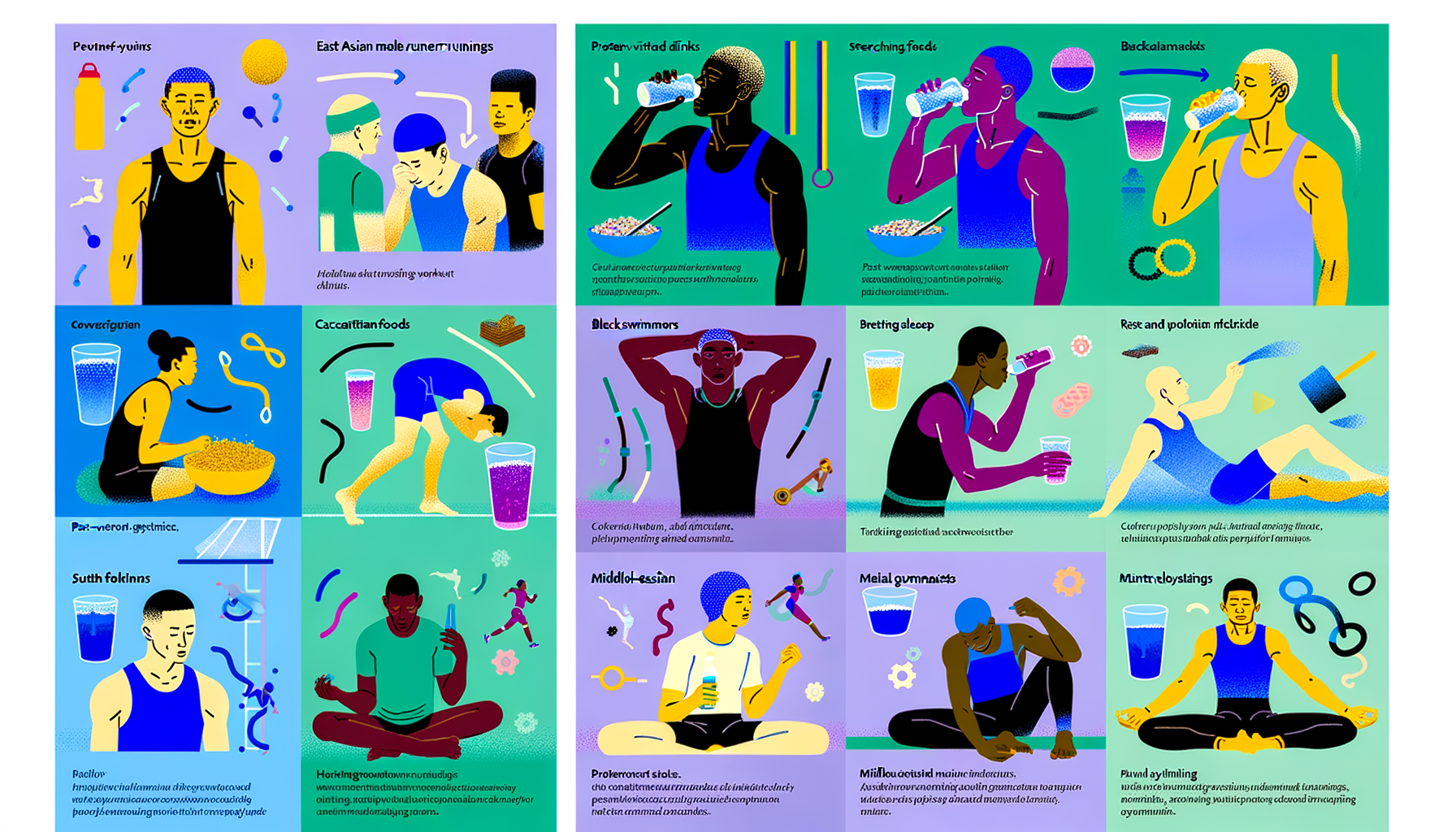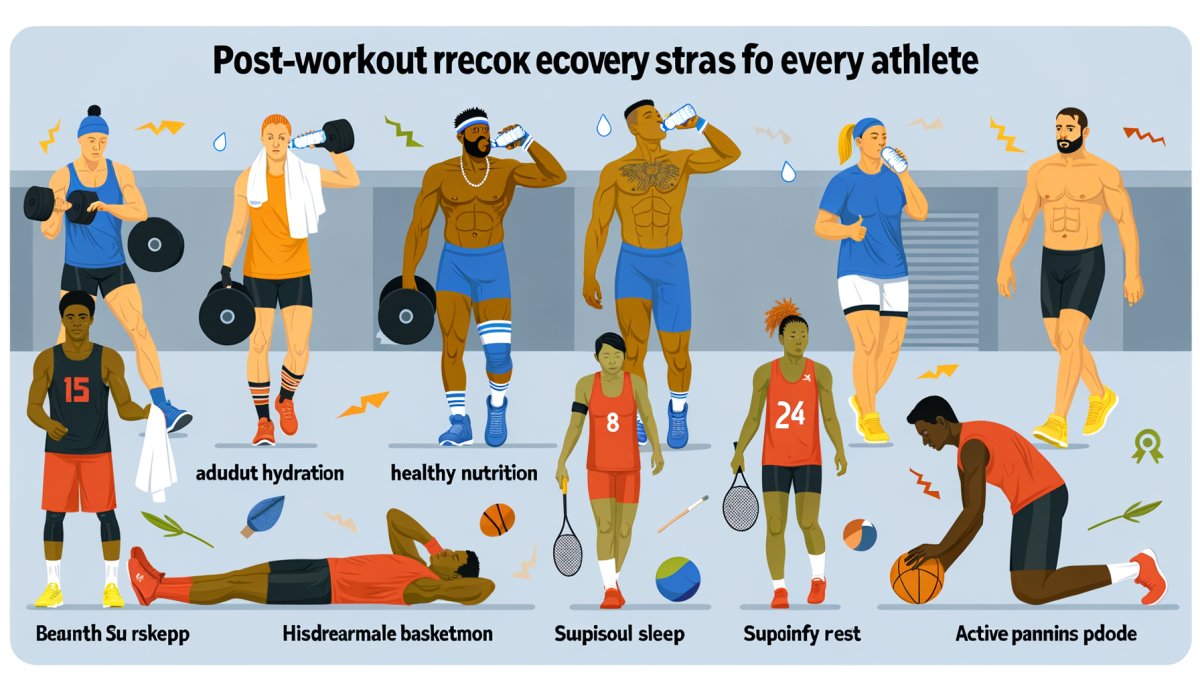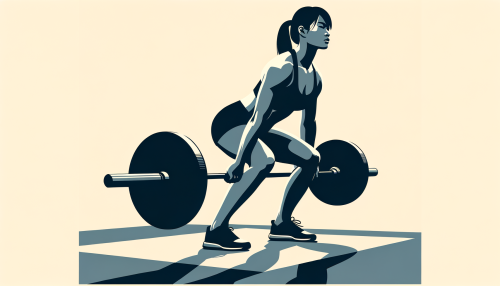Introduction
Post-Workout Recovery: Essential Strategies for Every Athlete is a comprehensive guide that provides athletes with crucial information on how to effectively recover after intense training or competition. It covers a range of strategies, from nutrition and hydration to rest and active recovery, all aimed at helping athletes maintain their physical health, enhance their performance, and prevent injuries. This guide is a valuable resource for athletes of all levels, offering insights into the science of recovery and practical tips for implementing these strategies into their post-workout routines.
Maximizing Post-Workout Recovery: Essential Techniques for Athletes

Post-workout recovery is a crucial aspect of any fitness regimen that often gets overlooked. Whether you’re a professional athlete or a fitness enthusiast, understanding and implementing effective recovery strategies can significantly enhance your performance and overall health.
Firstly, let’s talk about the importance of hydration. During a workout, your body loses a significant amount of water through sweat. This loss can lead to dehydration, which can negatively impact your performance and recovery. Therefore, it’s essential to replenish these lost fluids by drinking plenty of water or sports drinks that contain electrolytes post-workout. This will not only help to rehydrate your body but also replace the essential minerals lost during your workout.
Moving on, let’s discuss the role of nutrition in post-workout recovery. Consuming the right nutrients after a workout is just as important as what you eat before. Your body needs adequate protein to repair the muscle tissues damaged during exercise. Carbohydrates are also crucial as they replenish the glycogen stores depleted during your workout. A balanced meal or snack containing both protein and carbohydrates within 30 minutes to an hour after your workout can significantly enhance your recovery.
Next up is the importance of rest and sleep. Your body does most of its healing when you’re at rest, particularly during sleep. During this time, your body produces growth hormone, which aids in tissue repair and growth. Therefore, getting a good night’s sleep and taking rest days in between intense workout sessions is vital for optimal recovery.
Another essential recovery strategy is active recovery. This involves performing low-intensity exercises on your rest days, such as walking, cycling, or yoga. Active recovery helps to increase blood flow to the muscles, promoting healing and reducing muscle soreness. It’s a great way to keep your body moving without putting too much strain on it.
Lastly, let’s not forget about the role of stretching and mobility exercises in post-workout recovery. These exercises help to increase flexibility, improve circulation, and reduce muscle tension. Incorporating a regular stretching routine into your workout regimen can help to prevent injuries and enhance your athletic performance.
In addition to these strategies, there are also several recovery tools and techniques that athletes can use to enhance their recovery. These include foam rolling, which can help to relieve muscle tension and improve flexibility; massage, which can aid in muscle recovery and relaxation; and ice baths or cold therapy, which can help to reduce inflammation and speed up recovery.
In conclusion, post-workout recovery is an essential part of any fitness regimen. By implementing effective recovery strategies such as proper hydration, nutrition, rest, active recovery, and stretching, you can enhance your performance, prevent injuries, and improve your overall health. Remember, your body needs time to heal and adapt to the physical stress of exercise. So, listen to your body and give it the care it needs to recover effectively. After all, taking care of your body post-workout is just as important as pushing it during your training sessions.
The Athlete’s Guide to Post-Workout Recovery: Strategies for Success
Post-workout recovery is a crucial aspect of any athlete’s training regimen. It’s the time when your body repairs and strengthens itself between workouts. It’s also the time when you replenish energy stores and fluids lost during your workout, and it’s when your body adapts to the stress of exercise. So, how can you make the most of this critical period? Here are some essential strategies for every athlete.
Firstly, it’s important to understand that recovery starts as soon as your workout ends. One of the most effective ways to kick-start this process is by consuming a post-workout snack or meal within 30 minutes of finishing your workout. This meal should contain a balance of protein, to aid in muscle repair, and carbohydrates, to replenish energy stores. Some athletes swear by chocolate milk as a post-workout snack because it naturally contains this balance. Others prefer a protein shake or a meal with lean protein and complex carbohydrates.
Hydration is another key component of post-workout recovery. During exercise, your body loses fluids and electrolytes through sweat. Replacing these is crucial to prevent dehydration, which can hinder recovery and negatively impact future performance. Water is always a good choice, but if you’ve had a particularly long or intense workout, a sports drink can be beneficial to replace lost electrolytes.
Sleep is often overlooked as a part of post-workout recovery, but it’s actually one of the most important aspects. It’s during sleep that your body does most of its repairing and rebuilding. Aim for 7-9 hours of sleep per night, and try to maintain a consistent sleep schedule. If you’re having trouble falling asleep, try implementing a relaxing bedtime routine, and make sure your bedroom is dark, quiet, and cool.
Active recovery is another strategy that can be beneficial. This involves doing low-intensity exercise on your rest days, such as walking, cycling, or yoga. Active recovery can help to increase blood flow, which aids in muscle recovery, and it can also help to alleviate muscle stiffness and soreness.
Finally, don’t underestimate the power of stretching and foam rolling for post-workout recovery. Stretching can help to increase flexibility and range of motion, and it can also help to alleviate muscle tightness and soreness. Foam rolling, also known as self-myofascial release, can help to break up muscle knots and increase blood flow to your muscles.
In conclusion, post-workout recovery is just as important as the workout itself. By implementing these strategies, you can help to ensure that your body recovers effectively, which can lead to improved performance in your future workouts. Remember, every athlete is unique, so it’s important to listen to your body and find what works best for you. Whether it’s a post-workout snack, plenty of hydration, a good night’s sleep, active recovery, or a combination of these, taking the time to recover properly can make a big difference in your athletic performance.
Unlocking Athletic Potential: Essential Post-Workout Recovery Strategies
Unlocking your athletic potential goes beyond the sweat and strain of your workout routine. It’s about what you do after the workout that truly counts. Post-workout recovery is an essential part of any athlete’s regimen, and it’s often overlooked. However, it’s during this recovery period that your body rebuilds and strengthens itself. So, let’s dive into some essential strategies for post-workout recovery that every athlete should incorporate into their routine.
Firstly, hydration is key. During a workout, your body loses a significant amount of water through sweat. Rehydrating after exercise helps to replenish the fluids lost, maintain a healthy balance of electrolytes, and aids in muscle recovery. It’s recommended to drink water before, during, and after your workout to prevent dehydration and promote optimal performance.
Next, nutrition plays a crucial role in recovery. Consuming a balanced meal or snack within 45 minutes to an hour after your workout can significantly enhance your recovery process. This meal should ideally contain a mix of proteins, carbohydrates, and healthy fats. Proteins help repair and build muscle, carbohydrates replenish glycogen stores, and fats aid in nutrient absorption.
Sleep is another vital component of post-workout recovery. It’s during sleep that your body does most of its healing and rebuilding. A lack of sleep can hinder your recovery process and negatively impact your performance. Aim for 7-9 hours of quality sleep each night to give your body ample time to recover and prepare for the next workout.
In addition to these, stretching and foam rolling are excellent ways to enhance recovery. Stretching helps to increase flexibility, improve circulation, and reduce muscle tension. On the other hand, foam rolling, also known as self-myofascial release, helps to relieve muscle tightness, soreness, and inflammation. It’s like giving yourself a deep tissue massage, helping to break up any knots and improve blood flow.
Lastly, rest days are not to be underestimated. While it might be tempting to push through and train every day, rest days are when your muscles have a chance to repair and grow. Overtraining can lead to injuries and hinder your progress. So, listen to your body and take a rest day when needed.
Incorporating these strategies into your routine can significantly enhance your post-workout recovery and help unlock your athletic potential. Remember, recovery is just as important as the workout itself. It’s during this time that your body adapts to the stress of exercise and realigns itself for future workouts.
In conclusion, post-workout recovery is an essential part of any athlete’s regimen. By staying hydrated, eating a balanced post-workout meal, getting enough sleep, stretching, foam rolling, and taking rest days, you can optimize your recovery process and enhance your performance. So, the next time you finish a grueling workout, remember that what you do afterward is just as important. Prioritize your recovery, and you’ll be well on your way to unlocking your full athletic potential.
Conclusion
In conclusion, post-workout recovery is a crucial aspect for every athlete as it aids in muscle repair, reduces fatigue, and enhances performance. Essential strategies include proper hydration, balanced nutrition, adequate sleep, and active recovery exercises. Incorporating these strategies can significantly improve an athlete’s overall performance and reduce the risk of injuries.





